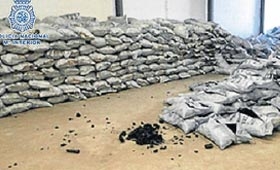Authorities dismantled a smugglers’ ring that trafficked hundreds of kilos of cocaine from Argentina to Europe, pointing to the continent’s increased importance as a consumer market.
As part of “Operation Patagonia,” a joint initiative between Spanish and Portuguese authorities, police seized 393 kilos of cocaine in late February. The cocaine is estimated to have a market value of over $18 million.
Seven Argentines were arrested, five of them in Lisbon, another in the Canary Islands, while the group’s supposed leader was detained in Barcelona, reports Clarin.
According to officials, the drug was smuggled in bags of charcoal (pictured above) between the ports of Buenos Aires and Lisbon. Experts told Clarin that the use of charcoal is ideal for traffickers moving cocaine as both are organic materials, making it much harder for authorities to scan and find anything suspect.
Police became aware of the group’s smuggling operation last December, after the traffickers apparently left behind a 14 kilo bag of cocaine in a shipping container. The ensuing investigation led to the identification and arrest of the Argentine suspects, as well as the seizure of the cocaine shipment in Lisbon some weeks ago.
No information has been released about the identities of the detainees, though Spanish police said the group’s alleged leader has a criminal history in Argentina and is “well known” there.
InSight Crime Analysis
Argentina has long been a key transit route for cocaine headed for Europe, while Spain acts as the continent’s primary gateway for drug trafficking organizations. According to the US State Department’s 2012 International Narcotics Control Strategy Report, Argentine officials believe that the country is an increasingly important transit country for cocaine, due to the aggressive counter-narcotics efforts in Colombia and Mexico forcing traffickers to look at alternate routes, combined with weak interdiction efforts in neighboring Bolivia (the world’s third highest producer of cocaine).
So far, however, it is unclear whether the Argentine nationals detained in Europe have any direct ties to the larger Colombian and Mexican transnational criminal organizations (TCOs). While such a link would not be surprising given the organizational capacity required to ship hundreds of kilos of narcotics, if the smugglers were acting alone, it could suggest that independent traffickers from Argentina are increasingly keen to exploit Europe’s growing cocaine market.

